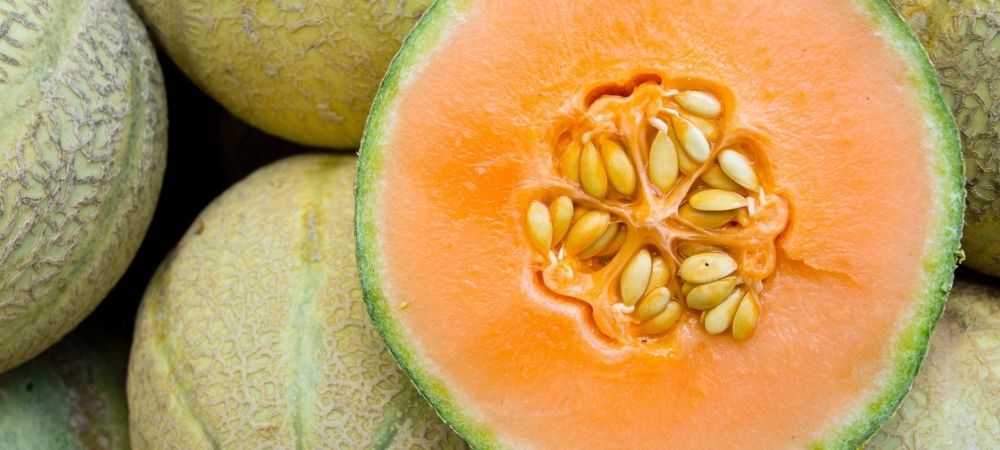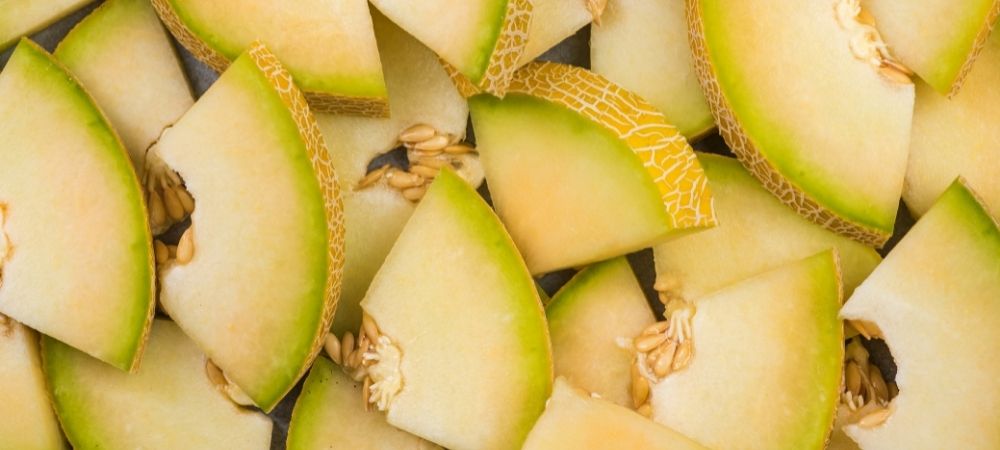
If you’re like me, you probably like honeydew melons even more than watermelons. Whether it’s summer or winter months, a little honeydew always goes a long way to make your day better.
And, naturally, you want to share this deliciousness with your four-legged friend.
Can dogs eat honeydew, too? Well, you’re in for a treat! Read on.
Can Dogs Eat Honeydew?
Yes, dogs can safely eat honeydew melon in moderation if they are not allergic to it. Honeydew offers loads of vitamins and minerals for your dog. It is a wonderful addition to a dog’s diet.
However, since it is also high in sugar, you should not feed too much honeydew to your furry companion. Avoid feeding honeydew melon to dogs that are allergic, obese, or diabetic.
Is Honeydew Good for Dogs?
Besides being delicious, honeydew melon is also a pretty nutritious treat. If you decide to feed your dog honeydew melon, you’ll be providing your furry friend with loads of good stuff.
Let’s see what honeydew contains.
Vitamin C
While dogs can produce vitamin C on their own, it is still important to give them various fruits and vegetables as part of their diet.
This is because different fruits and vegetables contain other nutrients that can benefit dogs in different ways. Honeydew melon is a nutritious fruit that is high in vitamin C, making it a good choice for a healthy dog treat.
Vitamin C is an essential vitamin for dogs and has many benefits. It helps to improve the immune system and can help to prevent cancer.
Vitamin C is also an antioxidant, which means that it protects cells from oxidative damage. This is important because it can help to keep dogs healthy and protect them from diseases.
Vitamin B6
Honeydew melon is also very rich in vitamin B6. B6 stabilizes blood sugar levels and governs fat and protein absorption. This vitamin is also crucial for healthy brain function and red blood cell production.
Vitamin E
Vitamin E is an important antioxidant for healthy skin, eyesight, fur, and nails. It also helps guard against free radicals, which can damage cells and lead to heart disease. This vitamin is vital for fertility in male dogs as well as their general health and well-being.
Dogs that don’t get enough vitamin E in their diet can suffer from a number of different problems. One of the most common is dandruff, which can cause excessive scratching and lead to other skin problems.
Vitamin E is also important for healthy eyesight, and a lack of it can lead to vision problems.
Potassium
Potassium plays a crucial role in a healthy nervous system. Additionally, potassium can help regulate blood pressure and heart rate. It is also vital for healthy muscles and metabolism. A lack of potassium can lead to muscle weakness, fatigue, and an irregular heartbeat.
Honeydew melon is a good source of potassium, making it a healthy choice for dogs.
Dietary Fiber
Honeydew melon is rich in dietary fiber. Dietary fiber is important for overweight dogs because it helps to regulate digestion and keep their bowel movements regular. It can also help to prevent some diseases, such as cancer of the colon.
Dietary fiber participates in the production of fatty acids in the gut, which fight bad bacteria. It also regulates dogs’ blood sugar levels. This can be especially important for dogs that are diabetic or prone to obesity.
Low Calorie
One cup of honeydew contains only 61 calories. This is great news for dogs that are overweight.
However, honeydew melons are still very high in natural sugars, so don’t overfeed dogs.

Is Honeydew Bad for Dogs?
When dogs eat honeydew melon, sometimes they experience health problems. Let’s look at the most common ones and which precautions you should take before giving your dog honeydew.
Upset Stomach
For some dogs, too much honeydew can lead to stomach upset and problems with a dog’s digestive tract. The symptoms are usually flatulence, bloating, and diarrhea.
If your dog is having digestive issues, you should stop giving honeydew to your canine. Either way, it’s best if you gave small pieces of honeydew one at a time.
Weight Gain
Honeydew contains a lot of sugar. If dogs eat too much sugar regularly, it can lead to weight gain, especially if our furry companions are inactive.
Additionally, you should avoid feeding honeydew melon to overweight and diabetic dogs.
Allergies
Honeydew is a fruit that dogs are sometimes allergic to.
Mild allergies are usually accompanied by panting, coughing, sneezing, diarrhea, flatulence, and vomiting. In extreme cases, allergies lead to choking, blocked airways, loss of consciousness, and sometimes death.
While allergies are usually nothing to worry about in mild cases, it is still a good idea to limit the amount of honeydew melon your dog consumes.
If your dog is having allergy symptoms, stop feeding them honeydew and investigate what other fruits and vegetables they might be able to eat.
Different Parts of Honeydew
Honeydew flesh is beneficial for dogs in moderation, but can dogs eat honeydew seeds and rinds? What about other types? Let’s see.
Can Dogs Eat Golden Honeydew?
Yes, dogs can safely eat golden honeydew.
Golden honeydew isn’t a different type of melon, but the name given to those that have been grown to be yellow. These melons still have the same nutritional benefits as a regular variety.
Just make sure to remove the seeds and rind. Cut it into small chunks and offer them to your pooch.
Can Dogs Eat Honeydew Rinds?
No, dogs can’t eat honeydew rinds.
These are the tough outer layer of the melon. Dogs can chew them, but most will swallow a piece. They’re not edible or digestible for dogs. Honeydew rinds pose a choking hazard and can result in intestinal obstruction.
Can Dogs Eat Honeydew Melon Seeds?
No, you should not feed your dog honeydew melon seeds.
Honeydew seeds could cause digestive issues, and a stomach upset if your dog eats them. Make sure to remove the seeds before giving honeydew to your dog.
How Much Honeydew Can Dogs Eat?
The amount of honeydew you can feed your dog depends on their breed, diet, and food sensitivities.
Is too much honeydew bad for dogs? It can be because honeydew still has a lot of sugar.
As a rule of thumb, a handful of honeydew per week is quite enough for your dog because of its high sugar content. For dogs that are overweight, diabetic, or have pancreatitis, it’s best to avoid honeydew melons.

How to Introduce Honeydew Melon to Your Dog?
If you’re just introducing honeydew to your dog, you should not give them too much. This is especially important if you don’t know whether your furry friend is allergic to them.
How much honeydew should you give them the first time?
One or two cubes of honeydew melon are enough. Monitor your dog for any signs of an upset stomach and other digestive issues. If they are having stomach problems, discontinue feeding them honeydew. If not, you can slowly increase the amount.
How to Prepare Honeydew Melon for Dogs?
Honeydew is a sweet treat that can be prepared in several ways for your dog.
Mashed Honeydew
The easiest way is to mash it up and add it to your dog’s regular meals for flavoring. Simply take out the flesh, remove the seeds, and use a blender or processor to get a uniform mix.
Frozen Honeydew
During the summer months, you could freeze small cubes of honeymoon. Once they are chilled, take them out and give your dog one small cube to munch on.
Blend With Other Fruits
Finally, why not try blending honeymoon chunks with other fruits that are safe for dogs? You could use apples, strawberries, or blueberries — dogs adore these! Just make sure not to use grapes or raisins, because even small amounts of these are extremely toxic to canines.
Can Puppies Eat Honeydew Melon?
It’s best not to feed puppies honeydew melons while they are still on the puppy food. Honeydew is still high in sugar, so a young dog’s stomach might be too sensitive.
Whenever you are introducing new food to a pup or an adult dog, it’s best to consult with the vet first. Your vet can give you guidance on the right amount and type of food to feed your dog.
When Life Gives You Melons
Thinking of letting your dog eat honeydew melon? You’re on the right track — honeydew is excellent dog food and part of a healthy diet. Most dogs can eat honeydew safely. Just make sure to feed them in moderation and check for allergies.
If your dog is allergic, obese, or diabetic, you shouldn’t feed them honeydew melons because of the high sugar content and allergic reactions.
Otherwise, feel free to enjoy some of that sweet deliciousness with your pooch.

